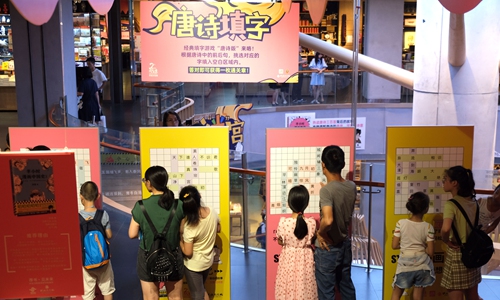HOME >> ARTS
Senior lecturer leads New Yorkers to wonderland of classical Chinese literature
Source:Xinhua Published: 2019/12/17 17:58:40

Chinese students try to solve puzzles related to Tang Dynasty (618-907) poetry. Photo: CNSphoto
Poetry, as Russian poet Yevgeny Yevtushenko once said, is "like a bird, it ignores all frontiers."
The famous quote is so true for Ben Wang, who has turned hundreds of New Yorkers who previously had no experience with Chinese literature into great fans of China's classical poetry, during his life-long lecturing at the China Institute, the oldest bi-cultural institution focusing on China in the US.
The soft-spoken man in his 80s started his cross-cultural adventure more than 30 years ago.
Beauty transcends languages
"The year 1985 was some kind of a turning point for me. That was the same year that I got a job at the United Nations and at the China Institute. They hired me to teach Chinese," Wang, also co-chair of China Institute's Renwen Society, told the Xinhua News Agency in a recent interview.
Founded in 1926, the China Institute offers a wide range of courses and programs about Chinese language and literature, philosophy, painting and calligraphy. The institute's Renwen Society is a communication forum that has since 2003 organized lectures and events on Chinese culture.
After one semester of teaching Chinese, Wang approached the then director of the institute and suggested opening a course on the poetry of the Tang Dynasty (618-907). What started off as a class of four or five students grew very fast.
"The following semester they asked me to teach the rest of the classical Chinese literature and more and more people joined the class. So now I have had over 35 students in the past six, seven years," said Wang, who was named Outstanding Citizen of New York City by the city council in 2003.
Also an acknowledged translator of English and Chinese literature, Wang has translated 39 classical Chinese dramas into English. Some of the kunqu, an form of ancient Chinese music drama, that he translated, were published in a highly-praised book Laughter and Tears.
The senior professor not only teaches multi-layered meanings of the Chinese poems, but also asks his students to translate ancient masterpieces into English after school. His enthusiasm impacts the way his students approach their translations, and sometimes they can hardly wait to receive his feedback on their translation drafts.
Interestingly, most of his students had zero knowledge of Chinese language.
"I am really surprised that those who had never been exposed to the study of Chinese, appreciate it through my explanation in English. They get the essence of it. Then they go home and struggle with the translation. But it turns out to be beautiful," he said.
For each poem, Wang provides his students with an introduction in English, a literal translation in English, a Latin transcription and the tone marks of the original Chinese text, before analyzing every single character in the poem.
"By the time we finish one poem, they understand it. Every single Chinese character is a story," Wang said.
"China's current efforts to preserve traditional culture are admirable and are to be respected," he said.
"As a big nation, China cannot be without literature, poetry or art, which last forever and are larger than life."
Knowledge is power
Currently, Wang is preparing a second course on classical poetry of China's Tang, Song (960-1279) and Yuan (1279-1368) dynasties, which will start in January 2020.
Wang himself started reading Chinese classics and philosophy at a very young age. He was already acquainted with the famous Confucian masterpieces at 12, while his real love for Tang poetry happened in his 40s.
The professor said he and his students have, through constant interaction, inspired each other. A book of his students' translations, edited by him, is expected to come out in the spring.
"I will write the foreword just to say that these are my 'babies.' I am so proud of their works. It sounds like I am blowing my own horn, but it really is true that their translations are getting better and better," he said.
"Now they understand what the Chinese poets set out to do. They use one character, but that is referring to so many things. There are metaphors and layers," he added.
"They can venture out to offer their own interpretations and opinions. Their works are not of lesser quality than other published translations."
His students, in their 40s on average, are, as Wang likes to say, "addicted" to Chinese poetry, and they often invite their friends to come take part and more people are "getting hooked."
As his students gradually come to understand Chinese culture, Wang believes that this path will lead to less and less cultural misunderstandings between the US and China.
Nevertheless, Wang said there is not enough exposure to Chinese culture in US society.
"Western linguistics has nothing to do with Chinese language, which is like a mix of pictures and music. Every character is a pearl and calligraphy is so important, yet not taught enough in the US."
Moreover, according to Wang, teachers of Chinese language and culture must master English in order to transfer the knowledge of Chinese, which is in his words "not cerebral, but visual."
Newspaper headline: ‘Addicted’ to poetry
Posted in: ART,CULTURE & LEISURE